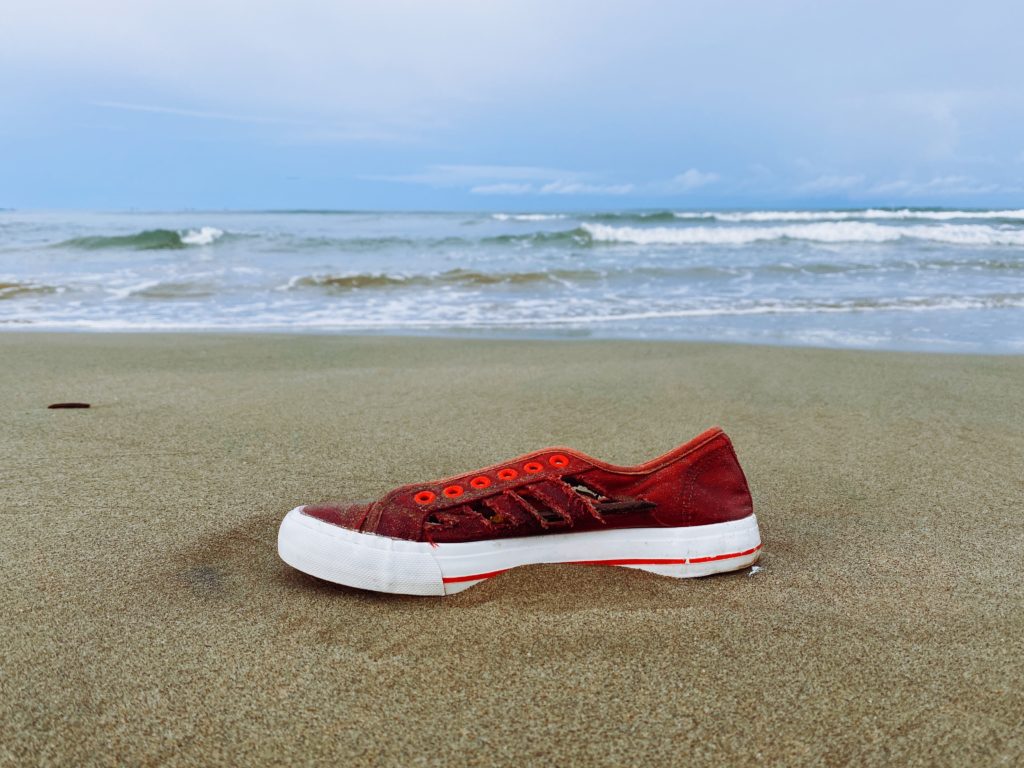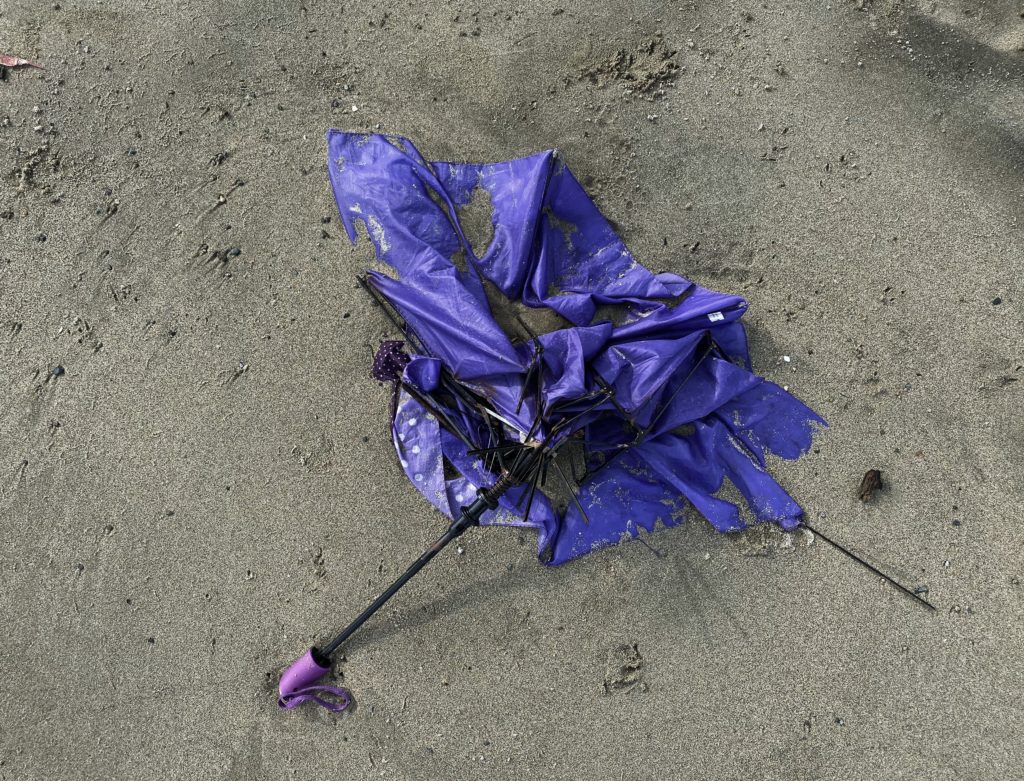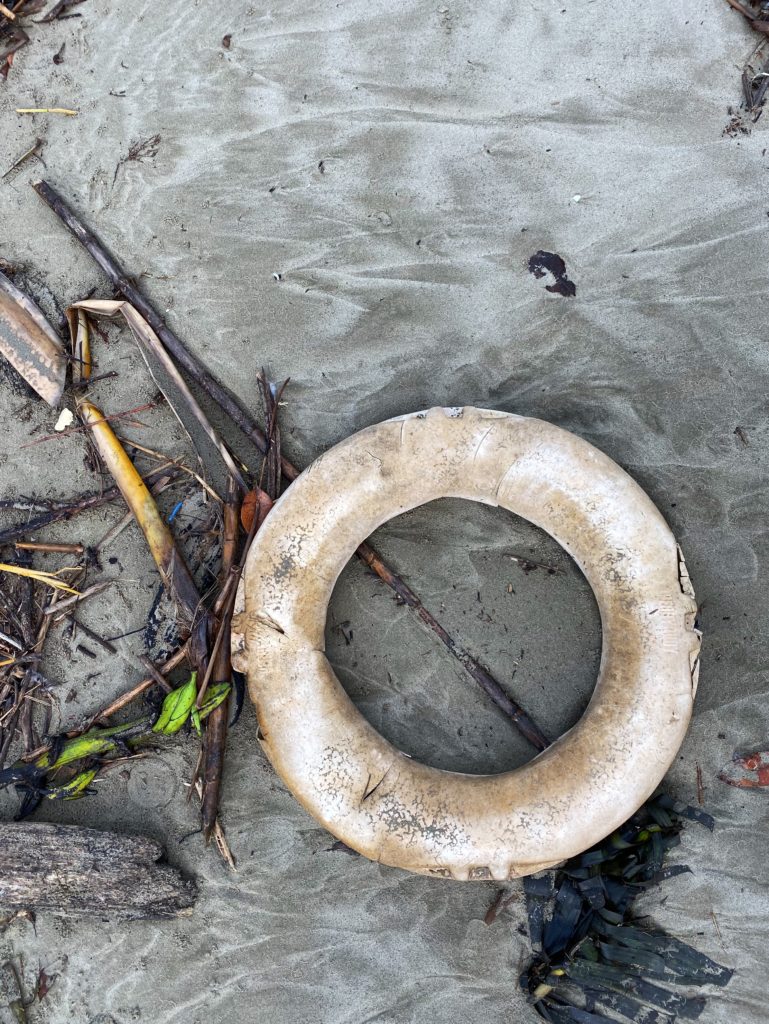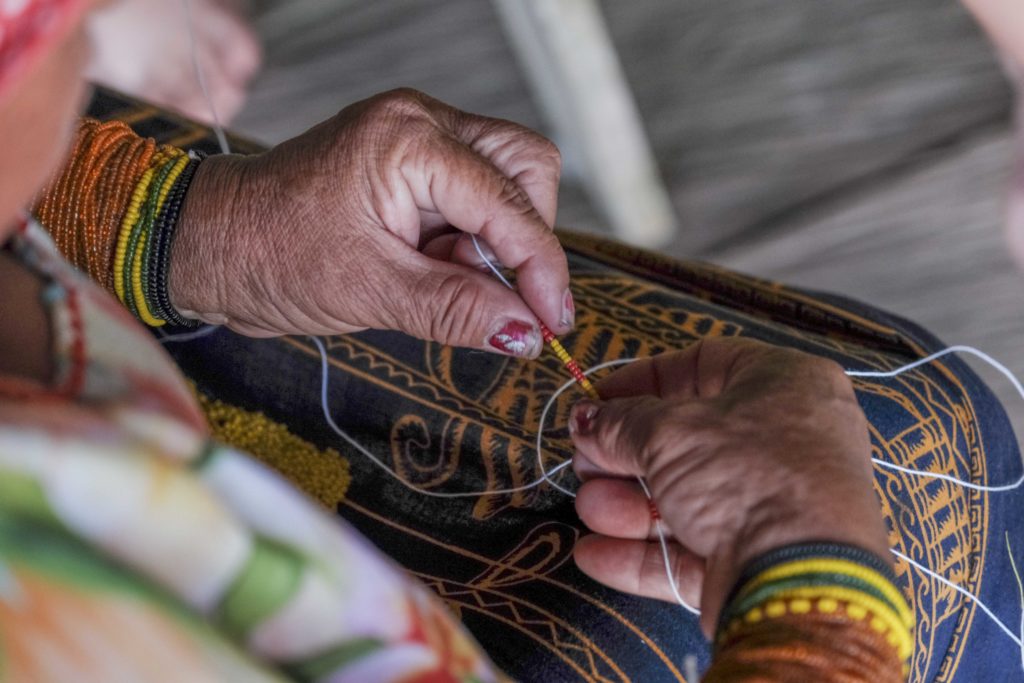I walk into a breakfast conversation on dreams. Charlotte dreamt that she was late to go fishing with Nacho because she hadn’t set an alarm. She raced to the shore where Nacho was waiting but he couldn’t see her. She was waving and jumping around but it was as if she were a ghost, haunting him.
Every coconut is worth 40 cents. They are put on a boat and sold in Columbia. People here wait for the coconuts to fall before harvesting them. No monkeys climbing up to pluck them from trees. This slow process keeps the natural rhythms of the coconut tree, prolonging its life.
Caroline wants to find out more about the origin myth of the Guna, specifically between god and the woman figured as Mother Earth. According to Nacho, God and the mother exist together, creating in a dual fashion. Father God has a duality. God set up two worlds, feminine and masculine. The feminine world is called Nawana. The masculine world is where God dwells. And where humans go after they die. In the Congress, they sing thank you to Nana and Baba, almost universal terms for elders everywhere.
This stands in contrast to the Catholic tradition, which Nacho says is an example of a late use of the woman in the history of religion. For the Guna, it is the woman who gives life to the communities and produces in terms of Mother Earth and reproduction. Mother Earth needs to get dressed, so we have to work the ground, harvest and love Nature. Education and technology moves people away from the land, into the barrenness of cities. It’s not just about subsistence farming here, nature needs man just as much as man needs nature.
A father would always give more possessions to the daughter and to the sons, because when a couple marries, the man comes to live in the house of his wife’s family. The man comes to work for the woman. Even Nacho only came to live in his current house seven years ago. If a man makes a mistake, his father-in-law disciplines him before he is allowed back into the house. If he really messes up, the Congress disciplines him.
And if a man or a woman kills someone else, the killer is caught and put alive into the grave along with his or her victim. There was a murder case twenty years ago after a chicha. A teenager, 16 years old and very drunk, entered the village on a donkey at nine in the morning and he cantered into the chicha house, still on the donkey. He was told off by a sahila and he didn’t like this so he attacked the sahila. A young man stepped up to defend the sahila but the teenager drew a knife and stabbed the young man in the face. He went to the hospital but died from his wounds. The one policeman in the village managed to arrest him but he now had a problem. If he gave him to the community, they would kill him and he would be an accessory to his death. So the policeman decided to protect him. He let him go and the killer went to Puerto Obaldía and surrendered. The Gunas tried to take him back to try him in their way but were not successful. So they went to the family of the killer and took everything in the house, even the house, and gave it to the family of the deceased.
Nacho’s memory is a house, every room known intimately to him. A robust, strong house, finely detailed and rich with the trappings of a life fully lived. And with each new day, the house grows a little larger. Yesterday, he just finished building a small coop for the hens, who knows what he will build today?
You are born in a hammock and you die in a hammock. The body is wrapped in a hammock and lowered into the ground. It is like a second birth for the Guna. Once they are buried they will go to the other world.
One of the best parties that Nacho remembers was the farewell party of his mother. She was a midwife, was a hammock-maker and a mola designer. A very important person in the village.
For the Guna people, the women are tasked with making and the men are tasked with memory. Only men are allowed to be sahilas. Throughout their history, it was men who organised village life and who learned to build. Both genders carve out their place not in a sense of equality but in terms of role.
If a man were to commit a crime such as smoking weed and be unrepentant about it, the Congress would punish him by ordering into a hole filled with fire ants. Just like the movies. His head and genitals covered, he’ll be left there for ten minutes at a time. This could happen up to eight times over a few days. But it isn’t all bad. The Guna believe that ant bites aid circulation and some of the older folk regular go for these sessions for their legs. The very definition of tough love.
This morning I write a lyric for a melody that Luis plays on his guitar. It is a gentle tune that reminds me of standing on the shore and looking out to sea. We manage to record it before lunch.
Slow Return
The sea rolls in kindness
The sun brings a blessing
Where we must walk
The day is bright
The beach that saw our love
And sang the songs of old
That teach us truth
The way to live
May we meet here again
As often as the tide
To listen for the change
From darkness to light
My love is oceans away
The clouds carry these words
May birds give you
their morning songs
May we meet here again
As often as the tide
To listen for the change
From darkness to light
Nacho cooks us lunch: a different river fish, plantains, rice and a spicy salsa side dish. There are tiny peppers inside, the size of a papaya seed, but they burn the lips and sting all the way down. I try one and it is more than enough for me!
I carry on working on my short poems of found plastic and small installations of found natural objects. I have about ten poems so far. I can see it coming together as a kind of photo poetry chapbook. Probably an e-book because it’ll cost too much to print.

Processed with VSCO with g1 preset 
Processed with VSCO with l6 preset 
Processed with VSCO with m6 preset 
Processed with VSCO with q3 preset 
Processed with VSCO with l6 preset 
Processed with VSCO with ss3 preset 
Processed with VSCO with ss1 preset 
Processed with VSCO with u5 preset 
Processed with VSCO with j1 preset 


(this is for the lightbulb)
Warm currents tug at our toes
as we walk between undying bottles.
The occasional frog splays in death,
holding an omen or a kindness.
When the sun sets the beach inks
itself into an invisible roar of waves.
Bulbs of sea fruit long forgotten
slowly harden into dreams.
If a jellyfish were to sting you,
first there is an electric surge,
all the lights going on at once;
and then comes the pain.
This afternoon’s lecture is about the string sheaths worn by the Guna women on their arms and legs. They are called uinnis. A woman sews one on Bernie’s arm for a whole hour. It’s painstaking and she probably only completes ten per cent of the entire sheath. One whole sheath costs $20 USD. The designs are mostly colour blocks and traditional geometric patterns from the molas.

Tomorrow morning we are going to collect coconuts with Nacho at 6 am. And in a few days, we will be taking an overnight trip to another community, very likely before the chicha ceremony, which is due to start on Wednesday.
Today is a rather beautiful sunset. Rich purple and orange hues shoot across the cloudy sky. We don’t actually see the sun, just its rays reflected on the water in slow ripples. Right on cue, a canoe paddles into the scene.

I sit in a hammock before dinner and think about what someone said to me a few days ago, “Don’t forget to read your Bible and pray.” It was sincere and well intentioned, but it is also a phrase I have heard all my life. It’s a mantra that is a Sunday school song but carries a veiled threat. IF you don’t… there’s no telling what would become of you. You’ll backslide, start doing drugs, sleep around, and become a shaman. And so on. And it used to make me feel guilty for not being a good Christian.
But I think about how the Christians around me don’t actually use the Bible in their daily lives; for them, it’s habit, like needing to practice the piano. Sometimes, a chore. Or at best, the equivalent of reading a charm aloud every day. And don’t forget how preachers abuse and treat the Bible like it’s context-free, devoid of the social conditions and historical epoch when it was written, how they twist and manipulate Scripture to the shape of their desires. But to read the Bible is in a way, to pray. Both are aspects of communion. To commune is to connect. And not just Communion as ritual, but communion as relationship.
Truth be told, I feel closer to something divine out here amongst the pagans, who, unlike us city dwellers, remain connected to the beauty, wealth and power of nature. And if nature is the bountiful creation of God, then they are doing a much better job of communing then we are. Ours is lip service in plush chairs and air-conditioned auditoriums. Our is a carefully crafted bullet point sermon and four songs practiced to chordal perfection. Ours is a sound and light show of emotive peaks and troughs. I feel nothing for the church. Why lift up a religion that has displaced all our stories? I feel saddened that I live in between cultures, knowing neither. When I learn about Guna mythology, when I listen to Maria talk about how she can read the Viking script and how she knows all the old stories, I feel bereft, an orphan in a multicultural city that remembers nothing and desires only the next empty edifice.
The iguana has been cooked in a stew. The texture is almost like pulled pork, but it tastes like a blend of chicken and pork. As we are walking back after dinner, a strange, almost eerie music floats over us. We set out to explore. It’s coming from the chicha house. Luz tells us that we have been invited inside to watch a rehearsal for the chicha ceremony.
Six men and six women face each other. The men begin moving back and forth powerfully, while blowing hard into a set of mouth reeds. The women hold maracas, which they bring down in a steady rhythm. The men symbolise a kind of power, a ploughing force while the women keep the tempo. Perhaps men are representing the idea of work while women are Mother Earth. There are variants of the same dance but in all of them the dynamic holds true. The men always moving impossibly back and forth for up to ten minutes at a time. The women match their movements in a more sedate fashion. They weave in and out, shift formation, and move in parallel, braiding themselves together like uinnis around the wrist. And all the while the melody, minor notes that build a palpable energy, plays on. It is mesmerising, hypnotic.
